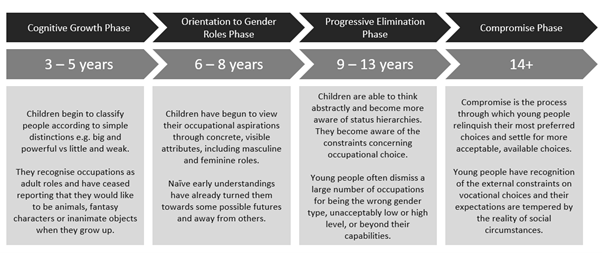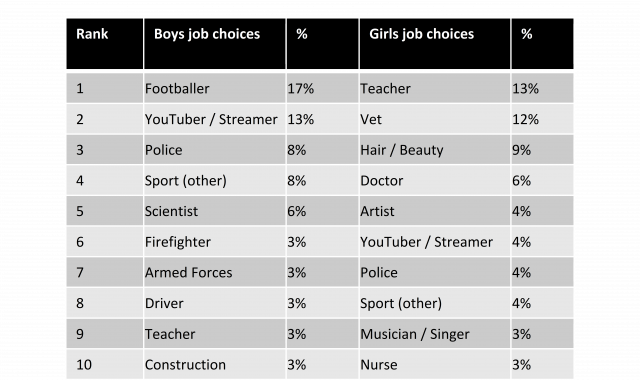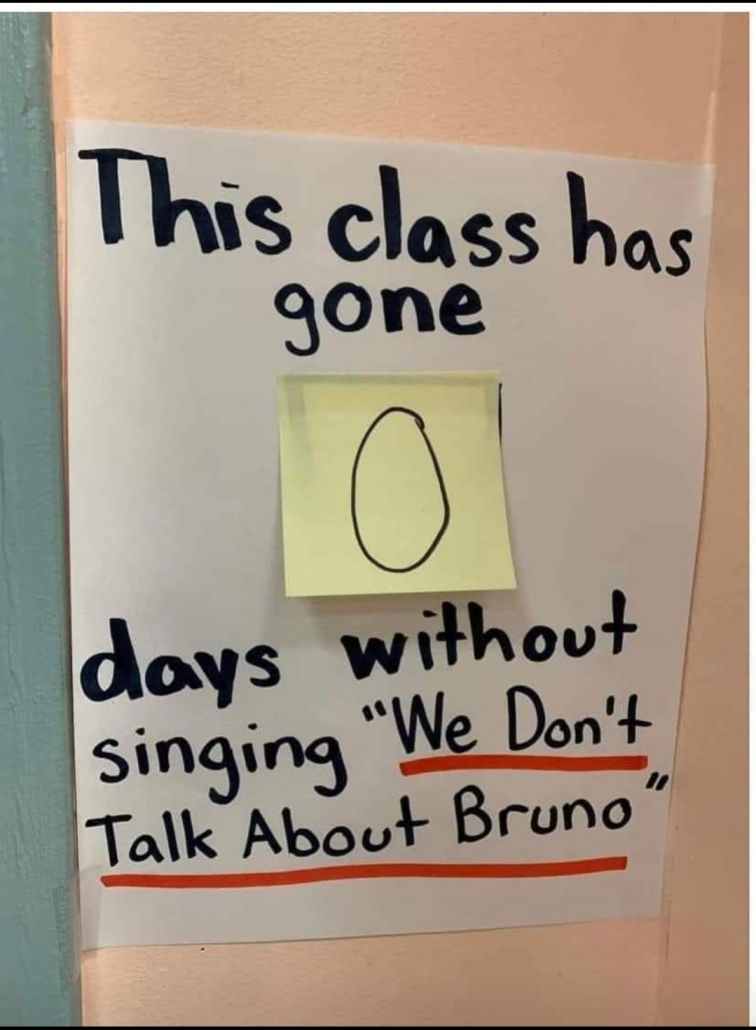I recently had the pleasure of speaking with Hamish Johnston from the Physics World podcast about how we can encourage children to consider careers in science, technology, engineering and maths (STEM). During the interview, Hamish asked me whether there was research evidence to show that children were making career choices as young as eight. Those of you that know about NUSTEM will know that this is one of the areas that we have been researching for the past few years. I thought it would be helpful to outline the two different ways that we’ve used to look at the career choices of children in primary school.
Zone of Acceptable Alternatives
The first method we have used is designed to explore what is the range of careers that children would consider doing in the future. This work is built on a theory proposed by Linda Gottfredson
called ‘Circumscription and compromise’ which describes how from a very young age children will limit their possible career choices based on the societal norms and expectations that they see
around them. The diagram below (from Gutman and Akerman (2008) and building on Gottfredson’s work) shows how children’s developmental progress gradually circumscribes the careers that they will consider from even before they start school, and then, once they are in the school system and start to understand some of the requirements of different jobs, they compromise their choices based on attainment and expectations. This leaves the children and young people with a Zone of Acceptable Alternatives: careers that they would be interested in doing, or at least, willing to do.

Children’s development of career ideas from Gutman and Akerman, 2008.
To measure young children’s Zone of Acceptable Alternatives, we developed a research game called STEMKAT (STEM Knowledge and Aspirations Tool). We gave children 30 different job cards and asked them to short the jobs into two piles: those they knew about, and those they didn’t know about. This gave us a simple measure of how many different jobs each child knew about. The jobs were chosen to be a broad range with some that children should definitely know about (e.g. teacher, doctor) and some that they might not have come across (e.g. entrepreneur, engineer). They were also chosen to have a range of qualification requirements and status.
Once each child had their collection of jobs that they knew about, we asked them to re-sort the cards. This time we asked them to put them into piles of ‘jobs I’d like to do’, ‘jobs I wouldn’t like to do’, and ‘not sure’. By looking at the ‘jobs I’d like to do’ and ‘not sure’ cards we have a measure of the children’s zone of acceptable alternatives.
What we found:
- Children in year 3 (age 8) knew about fewer jobs than children in year 5 (age 11)
- Children in year 5 had smaller zones of acceptable alternatives i.e. they said that they wanted to do fewer of the jobs.
- Job choices were strongly gendered, even in year 3. Of the STEM jobs on the list, boys tended to prefer jobs in the physical sciences, and girls tended to prefer jobs in the biological sciences.
You can read more about the detailed findings in our open access paper, including the positive effect that the work of NUSTEM in their schools has on children’s zone of acceptable alternatives.
Possible Selves
The second method that we have used to explore children’s career ideas uses a more straightforward method. This time we simply asked children to write down three jobs they would like to do when they are older, and why. This allows us to explore in more detail the range of specific jobs children are considering and how they see their future ‘possible selves’. This method draws on a theory developed by Hazel Markus and Paula Nurius (1986) who say that “possible selves represent individuals’ ideas of what they might become, what they would like to become, and what they are afraid of becoming, and thus provide a conceptual link between cognition and motivation.”
Many studies that look at what children would like to do tend to ask about only one possible self or future job (e.g. Drawing the Future, OECD The Future at Five). However, at NUSTEM we felt that it was important to look at the range of possible selves that children could envisage for themselves which is why we asked them to name three jobs they would like to do.
What we found:
- Career aspirations were generally limited to a small range of options: although there were 81 different types of role mentioned, the top 20 jobs named account for 75% of those roles.
- Career aspirations are strongly gendered, although there are some shared aspirations: teacher, you-tuber, police officer, and sport person.
- We can also classify girls aspirations as being more realistic or achievable than boys. The job-market for professional footballers and you-tubers is after all, extremely small, and so the likelihood that a child will achieve success in those fields in also small.
- Overall boys named a broader range of STEM aspirations than girls (28 vs 17), but that was still a small percentage of the jobs named.

You can read more about this research in our paper presented at an IEEE conference in 2020.
Using these research methods in schools
Our second method is a very simple way of looking at the range of jobs individuals, and classes, are considering. If you are thinking about how to broaden the range of aspirations of your classes, then this would provide a quick way to track changes in aspirations over time. At the beginning of the year (or planned activity) ask the children to write down what they want to do (and why), and then at the end of the year you can ask them to repeat this. Looking at the range of jobs in the class will give a simple measure of the zone of acceptable alternatives, and looking at changes in individual children’s choices will see if there has been a broadening of an individual’s possible selves.
A note of caution: children will have developed their career ideas over a long time, and so short-term interventions may not cause an observable change in their choices. However, NUSTEM work with primary schools has shown that over the long term, sustained career activity can broaden the range of acceptable alternatives that children have.
If you’d like to talk to a member of NUSTEM about using the research methods in your school or college, then please email us nustem@northumbria.ac.uk
References:
Linda Gottfredson (1981) “Circumscription and compromise: A developmental theory of occupational aspirations”. Journal of Counselling psychology, 28(6) 545
Leslie Morrison Gutman, Rodie Akerman (2008) “Determinants of Aspirations”, Research Report 27, Centre for Research on the Wider Benefits of Learning (IoE)
Hazel Markus, Paula Nurius (1986) “Possible Selves” American Psychologist, September 1986, pp 954-969
 If you haven’t seen this image doing the rounds – sorry, we don’t know who originated it – you very likely recognise the situation anyway. It’s been several months and this song is still everywhere.
If you haven’t seen this image doing the rounds – sorry, we don’t know who originated it – you very likely recognise the situation anyway. It’s been several months and this song is still everywhere.


